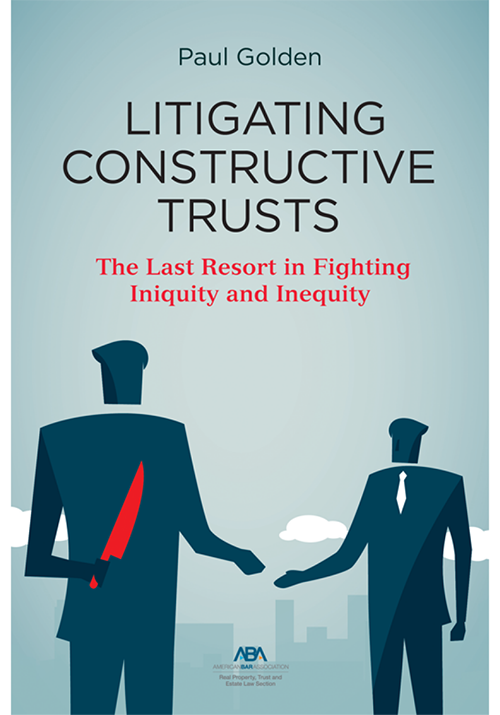Didn't get it in writing? There may still be a way, says author of 'Litigating Constructive Trusts'
“If you don’t have it in writing, you’re out of luck.” That’s the common wisdom you’ll hear from TV judges, helpful uncles, well-meaning friends and even lawyers in your life. But while getting an agreement in writing is a best practice, in some cases you—or your clients—might have more options than you think to enforce a unwritten agreement.
 (Cover art by Andrew Alcala/ABA)
(Cover art by Andrew Alcala/ABA)While the foundational principle of the Statute of Frauds holds that contracts must be written and signed to be enforced, there is a tool to create an exception. This tool is laid out in detail by Paul Golden in his new book, Litigating Constructive Trusts: The Last Resort in Fighting Inquity and Inequity. Golden, who has extensive experience in real estate and trust and estate law, believes far too few attorneys are aware of the potential benefits of constructive trusts.
In this episode of the Modern Law Library, Golden explains the concept of a constructive trust to the ABA Journal’s Lee Rawles. A constructive trust is a “legal fiction,” where (broadly speaking) a judge decides that between two parties with a relationship where trust could be assumed, there has been an egregious betrayal of that trust and an unjust enrichment to the betrayer. The judge can then retroactively declare that even without a written contract, a defendant had a fiduciary duty to the victim, and victim’s property must be returned to them.
“Traitorous partners, gold-digging girlfriends, old ladies being tricked out of preparing a fair will, and plain old murder,” writes Golden in the book. “These have been, and will continue to be, the subjects of constructive trusts. The facts in some constructive trust cases are so outrageous, one often feels like a voyeur, but without the shame.”
Golden explains the special benefits of a constructive trust, as well as defenses that can be made if your client is the subject of a constructive trust claim. Different jurisdictions have different standards for constructive trusts, and Golden and Rawles discuss the state of New York’s 4-prong test in detail. Most constructive trusts are based on case law, but some states do have a civil code about them. Golden offers advice to lawyers looking to use a constructive trust argument, and lists common trial issues they might face, including how to convince a judge they have the power to act to avert a deep injustice from continuing.
In This Podcast:

Paul Golden
Paul Golden is a New York litigator and a partner in Coffey Modica LLP’s Manhattan office. He is a former partner of Hagan, Coury & Associates, where he worked for 25 years in the field of appellate practice, insurance litigation, real estate litigation, commercial litigation and personal injury defense. One of his particular interests is constructive trust cases; since there was no book on the subject, he wrote his own. He has successfully argued dozens of appellate cases, including two before New York’s high court, the Court of Appeals. He has successfully obtained title to real property for his clients, even in several cases when his clients had no recorded deeds. Golden has also written several legal articles for various publications, taught continuing legal education classes, and lectured in Japanese law schools. Golden received his JD from the University of Illinois Law School, and his BFA degree from New York University, where he majored in film and TV production. He is the author of Litigating Constructive Trusts: The Last Resort in Fighting Iniquity and Inequity, published by the ABA. He is currently completing a new book on litigating adverse possession cases. He may be reached at [email protected]. (Photo by Hector Pachas Photography)



